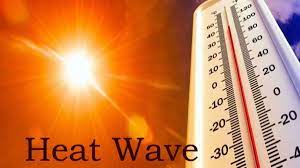Heat Wave
"Heat Waves: Nature's Fiery Fury"
A heat wave is a prolonged period of excessively hot weather, which can often be accompanied by high humidity levels. It is a meteorological phenomenon characterized by significantly higher temperatures than the long-term average for a particular region or time of year. Heat waves can vary in intensity and duration, but they typically last for several days to weeks.
Key characteristics of a heat wave include:
High Temperatures: Heat waves are defined by unusually high temperatures during the day and sometimes also during the night. Daytime temperatures can soar well above normal, often reaching into the 90s or even 100s Fahrenheit (30s to 40s Celsius).

A heat wave is a prolonged period of excessively hot weather, which can often be accompanied by high humidity levels. It is a meteorological phenomenon characterized by significantly higher temperatures than the long-term average for a particular region or time of year. Heat waves can vary in intensity and duration, but they typically last for several days to weeks.
Key characteristics of a heat wave include:
High Temperatures: Heat waves are defined by unusually high temperatures during the day and sometimes also during the night. Daytime temperatures can soar well above normal, often reaching into the 90s or even 100s Fahrenheit (30s to 40s Celsius).

Prolonged Duration: Unlike a brief hot spell, a heat wave persists for an extended period, typically for at least three consecutive days or more. Some heat waves can last for several weeks.
Humidity: High humidity levels can exacerbate the discomfort associated with a heat wave. When high temperatures are coupled with high humidity, the heat index (or "feels like" temperature) can be significantly higher than the actual air temperature, making it even more challenging for people to cool down.
Impact on Health: Heat waves can pose serious health risks, especially to vulnerable populations such as the elderly, young children, and individuals with certain medical conditions. Heat-related illnesses like heat exhaustion and heatstroke can occur when the body is unable to dissipate heat effectively.
Drought and Water Scarcity: Prolonged heat waves can contribute to drought conditions by increasing evaporation rates from water bodies and reducing soil moisture. This can have negative impacts on agriculture, water resources, and ecosystems.
Energy Demands: High temperatures during a heat wave lead to increased demand for electricity and cooling, straining energy grids and potentially causing power outages.
Effects on the Environment: Heat waves can lead to various environmental impacts, including wildfires, reduced air quality, and damage to ecosystems. They can also exacerbate the effects of climate change, as extreme heat events become more frequent and severe.
Social and Economic Consequences: Heat waves can disrupt daily life, impact outdoor activities, and strain emergency services. They can also lead to economic losses, particularly in sectors like agriculture and tourism.
Efforts to mitigate the impacts of heat waves often include public health advisories, cooling centers, and recommendations for staying hydrated and avoiding strenuous outdoor activities during extreme heat. Additionally, addressing the underlying causes of climate change is essential for reducing the frequency and severity of heat waves in the long term.
Humidity: High humidity levels can exacerbate the discomfort associated with a heat wave. When high temperatures are coupled with high humidity, the heat index (or "feels like" temperature) can be significantly higher than the actual air temperature, making it even more challenging for people to cool down.
Impact on Health: Heat waves can pose serious health risks, especially to vulnerable populations such as the elderly, young children, and individuals with certain medical conditions. Heat-related illnesses like heat exhaustion and heatstroke can occur when the body is unable to dissipate heat effectively.
Drought and Water Scarcity: Prolonged heat waves can contribute to drought conditions by increasing evaporation rates from water bodies and reducing soil moisture. This can have negative impacts on agriculture, water resources, and ecosystems.
Energy Demands: High temperatures during a heat wave lead to increased demand for electricity and cooling, straining energy grids and potentially causing power outages.
Effects on the Environment: Heat waves can lead to various environmental impacts, including wildfires, reduced air quality, and damage to ecosystems. They can also exacerbate the effects of climate change, as extreme heat events become more frequent and severe.
Social and Economic Consequences: Heat waves can disrupt daily life, impact outdoor activities, and strain emergency services. They can also lead to economic losses, particularly in sectors like agriculture and tourism.
Efforts to mitigate the impacts of heat waves often include public health advisories, cooling centers, and recommendations for staying hydrated and avoiding strenuous outdoor activities during extreme heat. Additionally, addressing the underlying causes of climate change is essential for reducing the frequency and severity of heat waves in the long term.
#HeatWave
#HotWeather
#ClimateChange
#StayCool
#HeatWaveSafety
#SummerHeat
#HeatWavePreparedness
#ExtremeHeat
#HeatWaveAlert
#HeatWaveAwareness
#HeatWaveTips
#HeatWaveImpact
#HotWeather
#ClimateChange
#StayCool
#HeatWaveSafety
#SummerHeat
#HeatWavePreparedness
#ExtremeHeat
#HeatWaveAlert
#HeatWaveAwareness
#HeatWaveTips
#HeatWaveImpact



Comments
Post a Comment